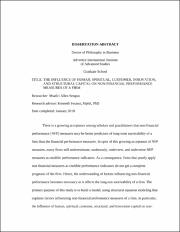| dc.description.abstract | Globalization has affected most of the aspects of human life. For organizations to
cope with globalization, change is needed. It is under the globalized gravity that the
Philippines is reforming its basic education program. After 44 years of K-10 Basic
Education Program, on May 15, 2013, the Senate voted the Republic Act No. 10533
“Enhanced Basic Education Act 2013”. Thus the K-12 program was adopted in the
Philippines. It was fully implemented in June 2016.
Like any change, the K-12 program in the Philippines occurred with concerns on
behalf of the stakeholders. Four fundamental questions guided this research (a) what is
the attitude of stakeholders and their level of concern towards the adoption of the K-12
program?; (b) Is there any difference of attitude and level of concern between
stakeholders based on the demographics considered in the study?; (c) what is the best
predictive model of the stakeholders’ attitude towards K-12 program?; and (d) Which
concerns influence the most the attitude of stakeholders towards the adoption of the new
K-12 ?
This study used a cross-sectional survey and correlational research design. Two
validated instruments were used to collect data. A total of 365 students and 129
facilitators from two public and ten private senior high schools in Silang were selected.
The independent variables were the length of school cycle and quality of education,
funding constraint and shortage of inputs, additional expenses incurred by parents,
increasing the school leaving age, comply with the global standards, and the effect of K-
12 on higher education institutions. The dependent variable is attitude. The descriptive
statistic, t-test, bivariate analysis, stepwise multiple regressions, and discriminant analysis
were used to analyze data.
Findings are the general attitude and levels of concern of stakeholders were
neutral. The t-test revealed a significant difference in attitude between male and female.
The t- test revealed also a significant difference in concerns between students and
facilitators. The correlation coefficient between concerns and attitude (r = .46, p < .01).
The overall best model predicted 26.3% of variance, 30% for students and 23.7% for
facilitators. The stakeholders’ attitude towards K-12, is most influenced by the effect of
K-12, on higher education institutions (r = .76), comply with the global standards (r =
.69), and the additional expenses incurred by parents (r = .64). | en_US |

